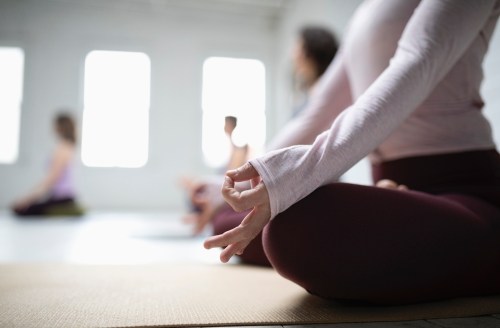Meditation might not be a good fit for everyone—here’s why
Meditation offers lots of benefits for physical and mental health. But the side effects of meditation can be difficult to deal with, too.

Eva*, a 31-year-old living in Paris, has dealt with severe anxiety for as long as she can remember. As an adult, she frequently experiences vivid flashbacks that take her right back to the trauma she experienced as a young girl, during which she can’t breathe, think, or work.
Eva heard about meditation and its benefits for physical and mental health, and decided to give it a shot to see if it would help with her anxiety. She downloaded a meditation app and started using it every other day. But instead of overpowering her stress or silencing her trauma, Eva experienced the opposite effect.
“When I attempt to make my anxiety go away using meditation, my mind fixates more strongly on the thoughts and issues at hand and [I get] overwhelmed,” says Eva, making meditation feel impossible. “The guilt afterward—that I could not clear my mind or focus for those 20 minutes—makes me feel like I wasted time and was a failure, and, therefore, the anxiety gets worse.”
Meditation can be potentially triggering
The majority of people can benefit from some kind of meditation practice, as it can help with a wide range of physical and mental issues, says Anne Dutton, LCSW, the director of mindfulness education at the Yale Stress Center. There’s so much evidence indicating that meditation can lift your mood, improve your focus, and help with stress management.
Yet stories like Eva’s are not unheard of. Many people anecdotally report feeling jittery or nervous after giving meditation a go. In fact, a 2017 study from Brown University found that 82 percent of meditators experience emotional side effects like fear, panic, anxiety, and paranoia at some point during their practice.
Health experts suspect this is because mindfulness and meditation-based interventions pull people’s awareness to their thoughts and feelings, some of which may be troubling. “You’re basically turning towards whatever is present instead of distracting yourself, so if you’re prone to rumination or very negative mood states, you will come into closer contact with them and that can be triggering,” Dutton says.
These triggering thoughts can potentially catch people by surprise and cause a panic—which of course negates any potential calm that meditation is supposed to bring. “The quiet of meditation practice may provide a platform for rumination without any boundaries if they are not well-versed in being able to bring their attention back to the breath,” says Sue Kim, MD, an internal medicine physician with Stanford Center for Integrative Medicine. This can make meditation genuinely difficult for people with a history of trauma or other mental health conditions like anxiety or depression.
Some people can work up to meditation—but don’t force it
None of this is to say that meditation is bad; countless studies show the benefits of meditation and other mindfulness techniques for helping to ease symptoms of depression and anxiety in particular. But if you find that meditation can be triggering or disturbing, there are some things you can do to address it.
“[Meditation] takes practice like any other sport or new activity,” Dr. Kim says—which is why people should ease into it to mitigate potentially upsetting situations. Just doing a few minutes a day through a guided meditation app is a good place to start, says Dutton.
Dutton also recommends going in with no expectations. So many people have hyped meditation up to be a stress-reducing cure-all and are disappointed when they’re not blissed out afterwards. “They’ve got an idea in their head about what it means to be helpful—it means I’m going to feel a certain way [after meditating]—and that’s going to be an impediment to actual practice,” she says.
If you start to spiral, use grounding techniques to bring your attention back to your breath and your body (think: applying pressure in the chest, touching something warm or cold, etc). Taking notice of those different sensations can help you calm down. Then stop your meditation for the day and revisit if you’re comfortable doing so.
Over time, you may start to get the hang of it. Meditation is, after all, a form of exposure therapy. “You’re sitting with discomfort in a sustained way and just by the exposure it tends to extinguish itself,” Dutton says.
However, if meditation persistently exasperates your anxiety or causes panic, health experts recommend avoiding it—especially if you’re by yourself. “If it does trigger distress, then certainly it’s best for individuals not to continue with the practice and to either seek professional guidance around meditation or pursue other activities that may produce similar benefits,” Dr. Kim adds.
To her point, it might be worth trying a different kind of activity, like a somatic body-based therapy or a moving meditation practice like yoga or tai chi. The key is to find something that can help clear your head of the excess noise and commentary life brings, Dr. Kim says. If it’s not meditation, that’s completely okay.
*Name has been changed
Here’s why the physical symptoms of anxiety can be so different from person to person. And here are some ways you can help a loved one with depression during the holidays.










